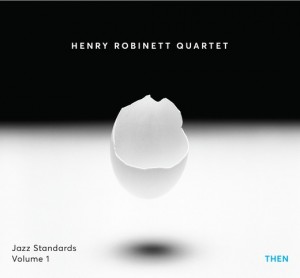From Sacramento, California comes guitarist, composer, bandleader and recording engineer Henry Robinett. On May 1st, he released his album “Jazz Standards, Vol. 1: Then” which he recorded 20 years ago together with
Joe Gilman – piano
Chris Symer – bass
Michael Stephans – drums.
Henry has some more details: “Honestly, I don’t know why I left it on the shelf for so long. I grew up listening to bebop, and the great bebop players had enormous influence on me. When I wrote and performed my own music, though, I naturally incorporated the wide range of music styles I had played with other bands. I think the Jazz Standards album was just too different from my other work, which made me hesitant to release it. But after listening to it again after so many years, I like it. I think it stands up well and shows another side to my playing.”
The album caught my attention because I was looking to write a review of a “traditional” Jazz album. I thought of looking back to Jim Hall whom I was listening a lot these days but lucky enough this album came along.
The album starts with “I Hear a Rhapsody” (a song which I always associate with Jim Hall), no intro, no extra warm up is needed. The melody starts right away and the band plays straight jazz music with great solos from guitar, piano, bass and 4×4 drums.
“Yellow Days” is the next song, beautifully played with Michael Stephans using brushes and a pushing guitar solo by Henry Robinett where he shows his ability to play incredible long lines of 16th notes.
The album continues with “The Days of Wine and Roses” a jazz standard which I always love to hear. The version from Henry Robinett is again without any frills just enjoying the very well known melody and changes in his entertaining solo. We also hear nice and straight solos from Joe Gilman on piano and Chris Symer on bass.
“The Way You Look Tonight” (after “Yellow Days”) another standard from Frank Sinatra’s repertoire is the next tune. The band plays it in fine up-tempo.
“Ill Wind” comes next. The medium tempo invites Henry Robinett on guitar and Joe Gilman on piano to play intensive 16th notes in their solos.
The album continues with “East Of The Sun” another standard which I like very much. Henry Robinett uses a Chorus effect on this song. Beautiful variety on the guitar sound. The piano solo is outstanding.
“Invitation” is the next song. The solos by guitar and piano are quite intensive and create a lot of tension. Michael Stephans on drums and Chris Symer on bass provide excellent support support for the soloists. One of my favorites on the album.
After this intensive tune we hear “Soul Eyes” a beautiful ballad. The band starts easy with brushes but Michael Stephans switches to drum sticks during the guitar solo where dynamics increase and returns back to brushes and soft support when the head is played again.
“Why Do I Love You” by Jerome Kern and Oscar Hammerstein comes next. A heavy swinging band is the main characteristic of this tune. Joe Gilman on piano convinces again with an extraordinary solo.
“Pinocchio” by Wayne Shorter is the last song on the album. This rather dissonant song feels like an open end to this otherwise compact and consistent sound and style. The reason is perhaps that Henry Robinett has some plans. He will be releasing a volume of jazz standards, called “Volume 2: Then Again” in the near future. He is also planning on releasing two volumes of contemporary standards, called “Volume 3: Now” and “Volume 4: Now and Again”.
“Jazz Standards, Vol. 1: Then” is a great compilation of very well known jazz standards played in a very traditional style where the guitar is used as a solo instrument, like a saxophone. Henry Robinett is responsible for the melody and the first solo and he is not comping during piano or bass solo. Very interesting to see his role in this album. Since all those songs are timeless classics the music has not collected any dust in the 20 years since it was recorded. If you like this standard approach to jazz music, here is an excellent example.
More information about Henry Robinett can be found on his website:
https://henryrobinett.com/
And here is the complete album on Spotify:

